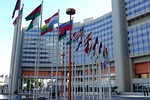To begin, I offer thanks for what sustains me: I thank the electric grid that allows me to publish this essay. I thank the natural gas, coal, hydro and nuclear power that fuel our electricity. I thank the engineers who design and operate utilities' voltage control and load following services. I thank the people who made and installed the generators, transformers, power lines and breaker boxes that deliver electricity safely and reliably.
I thank the 1000+ substances embodied in my computer and yours. I thank every living creature who contributes to or is affected by their supply chains.1
I thank the water used while doping silicon to increase transistors' electrical conductivity.2 I thank the people who sterilize our circuit boards with n-hexane, which causes leukemia and neural diseases.3 I thank the water that runs through the swamp coolers and air conditioners in the data centers that store my work.
I thank the access networks that connect our computers to the Internet.
I acknowledge that I spent more than six decades expecting safe, reliable, inexpensive power 24/7 without ever saying thanks for it.
Until recently, I expected that my use of electricity and the Internet would not harm the Earth. And I never really defined "sustainability."
Say that a product or service has "sustainability" if it's ecologically sound, economically viable, socially just and humane. Say that a society or a system is "sustainable" if it can continue indefinitely.
Is the Internet sustainable?
Do solar photovoltaics (PVs), industrial wind facilities and e-vehicles offer sustainability?
The United Nations' take on sustainability: two versions
In 2015, the United Nations initiated 17 Sustainable Development Goals (SDGs) as a blueprint for achieving a better and more sustainable future for all people. The SDGs include eliminating poverty and hunger; creating good health, quality education, gender equality, clean water and sanitation, affordable and clean energy, decent work and economic growth, responsible consumption and production; climate action; industry, innovation and infrastructure; and peace, justice and strong institutions.
In 2016, a year later, the UN's very own Environmental Program issued a report showing that countries that rank high on the SDG index--countries like Sweden, Germany, Finland and the U.S., where people buy plenty of "green" technologies--are actually among the world's most environmentally unsustainable.4
Countries where ores are mined and smelted (for computers, solar panels, industrial wind turbines and e-vehicles, etc.); where silicon (for transistors and solar panels) is smelted; where manufacturers take water from farmers to dope silicon for transistors and solar panels; where chemicals for devices and vehicles and batteries and infrastructure parts are manufactured; where our e-waste is discarded... these countries generate lots of CO2 and toxic waste and worker hazards... and they score low on the SDG Index. Countries like China, the Democratic Republic of Congo and India.
FYI, a sustainable level of consumption of natural resources runs about 7 tons per person per year. In the whole world, the average citizen annually consumes about 12 metric tons of natural resources. The average Swede consumes 32 metric tons of natural resources.5
In 1970, worldwide, we humans extracted 22 billion tons of primary, raw material from the Earth. In 2010, we extracted 70 billion tons. Increased population and consumption drive this extraordinary increase in extraction.
(Note: You can view every article as one long page if you sign up as an Advocate Member, or higher).






